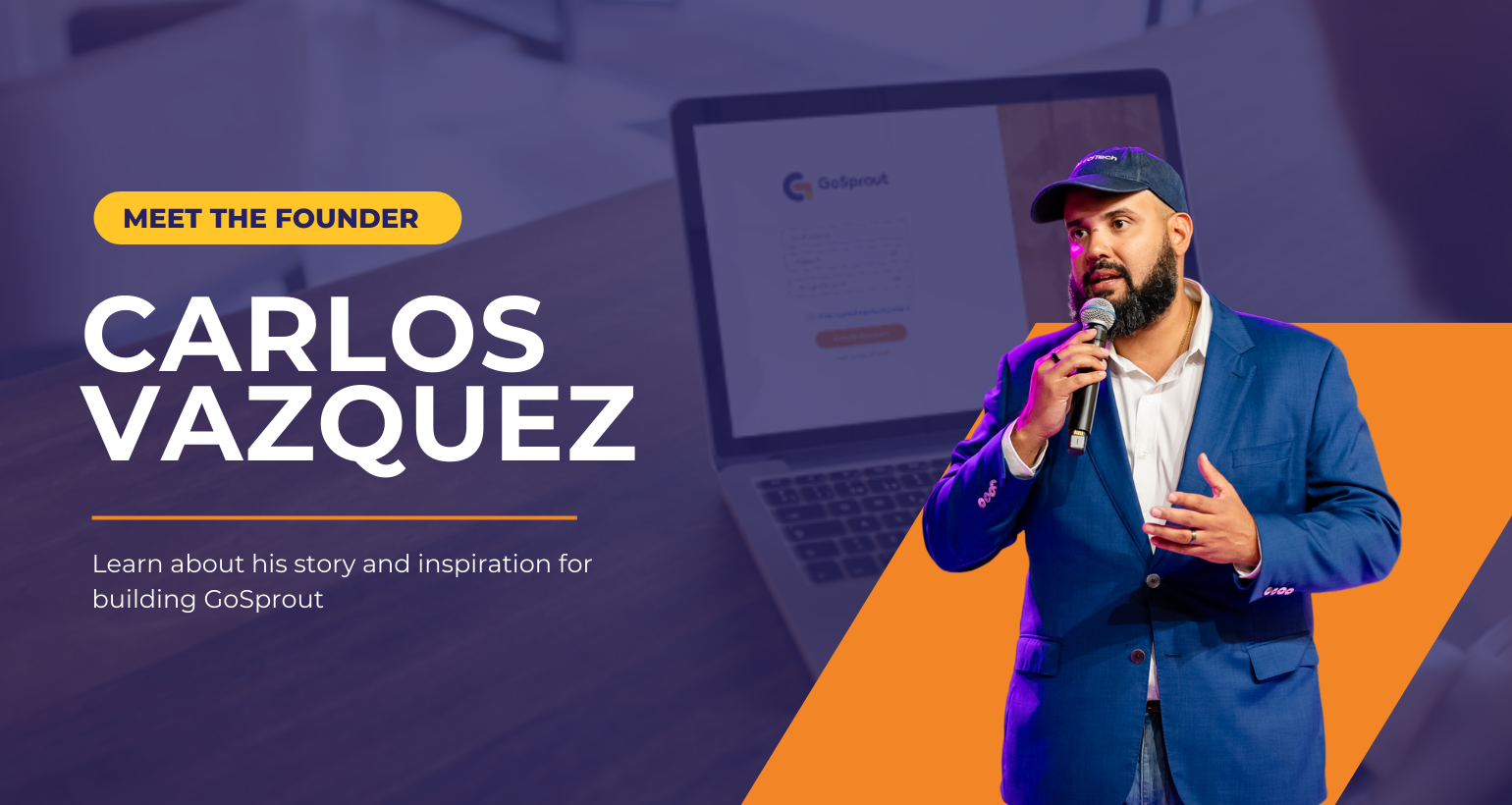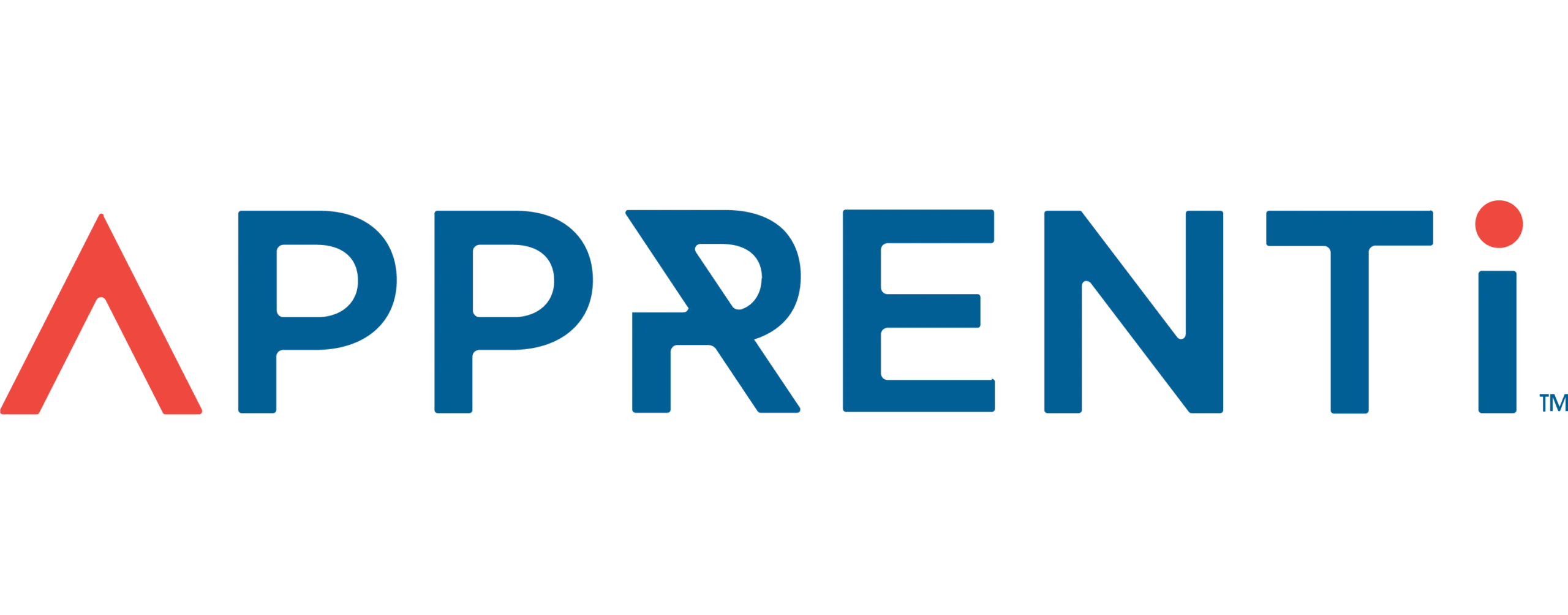Like every great superhero, a great software company has an origin story, usually grounded in the experience of its founder.
In our case, that’s Carlos Vazquez, whose early days in the Bronx and later career twists and turns cemented just how critically important access to an education and job readiness skills to Americans of all walks of life are if we’re to create paths out of poverty for our nation’s youth.
We sat down with Carlos so he could share his story and within it, the inspiration for GoSprout. Enjoy!
Childhood in South Bronx
Q: Carlos, you identify as a Puerto Rican but where did you actually grow up and how did you get there?
A: My father moved to the Bronx, NY from Puerto Rico as an adult. He met my mother (they lived in the same building) and fell in love. I was born in the South Bronx and would spend summers and holidays in Puerto Rico.
My dad passed away a few years ago but I have plenty of uncles, aunts, and cousins in Puerto Rico who I visit often, and now get to spend more time there given our work with Polytechnic University in Puerto Rico.
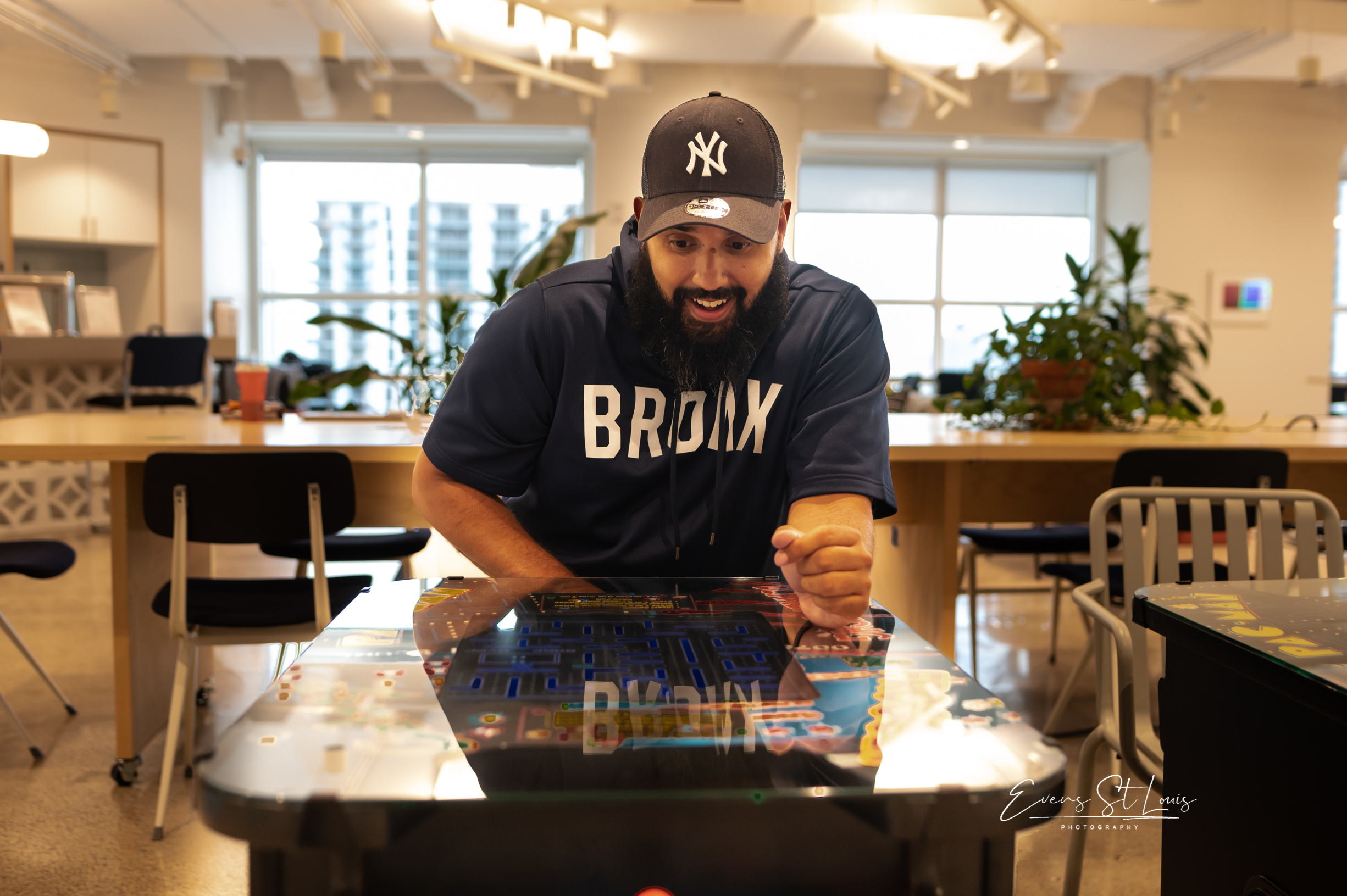
Q: What was your immediate family like?
A: I was the first to graduate college from my family, so you can imagine no one in my family was a high wage earner.
I am the oldest and since my mom was so young when she had me, I had to step up and help out around the house and with raising my 3 younger sisters. My grandmother played a huge role in my life as she helped my mom raise me. My mom was very strict and made sure that I didn’t miss school or veer off track. I grew up in a bilingual home and communicated with my grandparents in Spanish, which I really appreciate as it helped me master both languages.
I played sports growing up and stayed out of trouble by participating in different leagues and pursuing opportunities with community organizations. I saw a lot of friends and family members get caught up in trying to provide for their families without real career opportunities or jobs available. This motivates me to level the playing field as growing up you were made to believe that you had to leave in order to ‘make it’.
Q: What were the demographics of your block and neighborhood?
A: It was mostly Black and Hispanic and the South Bronx at the time was the poorest congressional district in the country despite being geographically only 10-15 minutes away from one of the richest.
In more practical terms as a way of making money, unfortunately, I saw a lot of young people get caught up in gangs or selling drugs to get by. I think the drug pandemic that swept the nation hit the South Bronx in the 80’s hit our neighborhood particularly hard. When you’re in an environment where you don’t know how your next meal is going to come or how you’ll pay rent – that can create a pretty desperate situation. Maslow’s hierarchy of needs captures the heart of this given that self-actualization can only arrive after basic needs are met.
Q: The Bronx is known as a “tough” area. What was it like to be a kid there? What kinds of things did you see that maybe children in more affluent areas would not encounter?
A: It took a long time to tell my story from a place of strength.
There was a drug pandemic and people were desperately trying to just survive, so my Mom really had to protect me.
I also saw the other end of the spectrum with dedicated parents who advocated for their kids and wouldn’t let the surroundings determine their future. That was my mom – she always saw something greater for me than what was on display in our local reality.
Growing up I saw a lot of my friends get put into ‘special education’ tracks mostly due to their behavior. I saw the impact of good teachers and unfortunately that of ‘bad’ teachers.
Overall, having started off there has been very motivational. Just understanding the connection between access to well-paying jobs and how different life can be if you don’t have those opportunities.
Helping create economic mobility is a big part of why I chose the path I’m on today. MLK marched for freedom AND jobs and too many times we place the blame on people who are in circumstances that don’t allow them to plan ahead – even past a day.
Q: What did kids there aspire to be when they grew up?
A: Growing up in that environment you aspire to be like people you see on TV: athletes, movie stars, singers, etc. People who looked like us weren’t represented in a lot of the material we consumed so there was a disconnect between what we could really accomplish and what society said we could.
My third grade teacher inspired me to want to be an oceanographer even though I had only ever been to the beach once or twice before. It showed me the impact an educator can have on the dreams and aspirations of their students, and I think this was inspiration for when I later started Miami EdTech.
Q: Tell us about your primary school. What was that like? Were you a good student?
A: I was a good student. I tried blending being a class clown with being a great athlete – just trying to be good at everything I did.
Teachers would get frustrated that I wasn’t tapping into my potential because school came naturally for me and I was a voracious reader and learner (as long as it didn’t interfere with sports or my favorite shows).
Perhaps because I was the oldest brother of three sisters, I took a genuine interest in all of my classmates and even teachers. I was known to protect those who were getting bullied by reasoning with bullies or picking them in recess.
I was also always interested in tech and how things work even at that age and loved taking things apart.
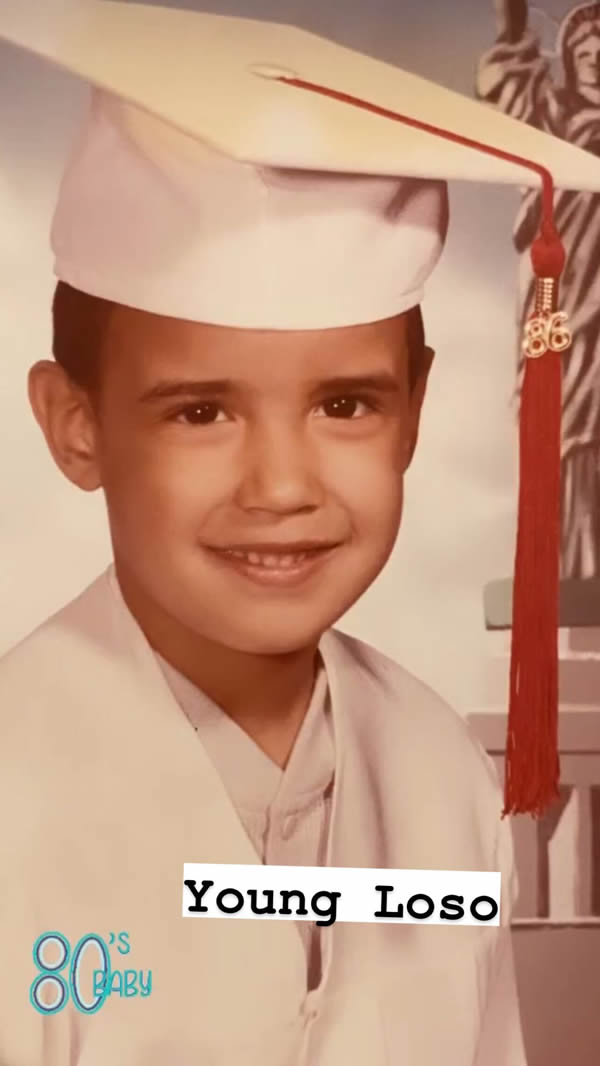
A Private High School Scholarship Expands Horizons
Q: What about high school? Where did you go and what were you into?
A: High school was a culture shock!
I moved to Rye, New York for High School, a city where the average household income is $364,543 compared to $34,908 in the South Bronx.
I got lucky because I was accepted into a Catholic high school and lived on the campus.
I met students from all walks of life there. There were only 60 of us, and we each brought a unique life perspective. I used to feel ashamed at not being able to afford a number of things, even as simple as lunch, while others boasted about vacation homes and luxury cars.
This was the beginning of a new experience in life that helped define my character.
Q: You graduated top of your class…what do you think was different about you and/or your support network that made that possible?
A: So, I’ve always been competitive. My High School was small so many of us played on different teams and were super competitive with each other both academically and athletically.
I wanted to be different and go to college. I knew I needed the right grades to qualify for a scholarship since my mom would not have been able to afford it.
Undergrad at Fordham University & a Growing Interest in STEM
Q: You then headed to Fordham University. What made you choose Fordham?
A: My grandma got sick my senior year of High School, and I knew that I wanted to remain local to be close to her.
I turned down a scholarship to Tulane University (I had never been to New Orleans but was obsessed with the culture). I had actually also turned down Columbia and NYU because I was afraid to commute and be alone in the city as well.
Fordham felt safe as a campus and despite being from the Bronx, I lived on campus and hardly made it back to the South Bronx.
Q: You eventually settled on Computer Science as your major. What appealed to you about CS?
A: I struggled with the adjustment to college and being in control of my schedule.
I had to work random jobs including graveyard shifts as a porter in NYC and in the security office at Fordham.
This took a toll on me and by my Junior year, I was in jeopardy of not graduating on time.
My academic advisor said that the most credits I had were in CS and it became an easy decision after that.
Q: You’ve mentioned that your awareness of disparities in the STEM landscape started to develop during this time. Can you describe what you saw?
A: I worked for an organization called CSTEP while at Fordham and started to appreciate the challenges faced by underrepresented minorities and be able to see the real impact in terms of the statistics that they had on hand.
The CEO at the time, Mr. Molina, became a mentor to me, and I started to realize how I defied the odds to go from the projects of the South Bronx to a premiere university like Fordham.
At CSTEP, I was a mentor to high-school students who were considering STEM careers and got a taste of the impact I could have. It changed my life.
Q: Even prior to graduation, you wanted to help and started contributing in the local community. Can you describe what you were doing and how you managed to do so while pursuing your undergrad degree?
A: While at Fordham, I leveraged my work-study experience as a mentor in the The Fordham Science and Technology Entry Program (STEP), an academic enrichment program established in 1986 and designed to prepare underrepresented minority and economically disadvantaged junior high and high school students (grades 7-12) for college and careers in STEM fields (science, technology, engineering, and math) fields, health careers, and licensed professions, like accounting, law, psychology, and social work among other licensed fields.
I also served as a Resident Assistant my junior year and stepped up to support the community after the events of 9/11.
A CS Degree In-Hand but No CS Job to Be Found & First Business Founded
Q: You were an excellent candidate for a job in computer science. What was your first post-undergrad job?
A: I struggled with finding a career opportunity in the traditional technology sector.
I think not having anyone in my network who could help me navigate the application and interview process was a big piece of the problem. I was paying rent myself and had to take the first job offer I got, which was actually my first interview, too.
I became a Sales Coordinator at a local Building Supply Company where the General Manager allowed me to tap into my computer science skills and gave me the opportunity to innovate.
I redesigned the website, upgraded the network infrastructure, and implemented tech solutions such as a CRM (which was relatively new at the time).
But I wasn’t very happy about that, so I enrolled in a Master’s Degree in Web Strategy and Design program while I kept working.
Q: Around this time, your entrepreneurial itch started. How did you first scratch it?
A: I had a small record label and recording studio called Regulator Entertainment.
We had a number of local artists reaching notoriety but no breakout stars or anything.
Fun fact: our producer later won numerous awards including Grammy’s. Personally, I always had a knack for scouting talent.
I helped a bunch of my friends who I grew up with turn their passions into real goals with access to a studio, legal assistance and marketing, and incorporating as a business.
I learned so much about business and relationships and enjoyed helping emerging artists get some marketing skills and resources together but ultimately didn’t keep going because I wanted to do something that I was more in control of in terms of outcomes.
A Fellowship, Deep Dive at the Intersection of Education & Technology, and Masters in Education from City College of New York
Q: So what was next?
A: I was really drawn towards a career at the intersection of education and technology.
I came across this really selective New York City Teaching Fellows program with only an 8% acceptance rate, but someone liked my application.
So I was actually placed in a 5th grade classroom just blocks from Fordham, and I was able to get my Masters in Education from City College of New York as well.
Q: What was the NYCTF experience like? What were your takeaways?
A: The whole program really resonated with me emotionally. With the students, I was extremely proud that my 5th graders had the highest test scores on record.
But I had some opportunities in my second year to really start to drive initiatives within the program, and I really wanted to focus on providing equal opportunity to underrepresented individuals.
Basically, I could see how powerful this program could be for kids from groups in similar situations to my own childhood, and the program gave me room to help with my particular emphasis on science and technology, but we also had some really cool programs like a partnership with Visual Thinking Strategies, a non-profit that used the facilitated discussion of fine art to help students develop critical thinking skills.
I was really proud of what I accomplished with NYCTF and felt like I really found my path while I was in the program.
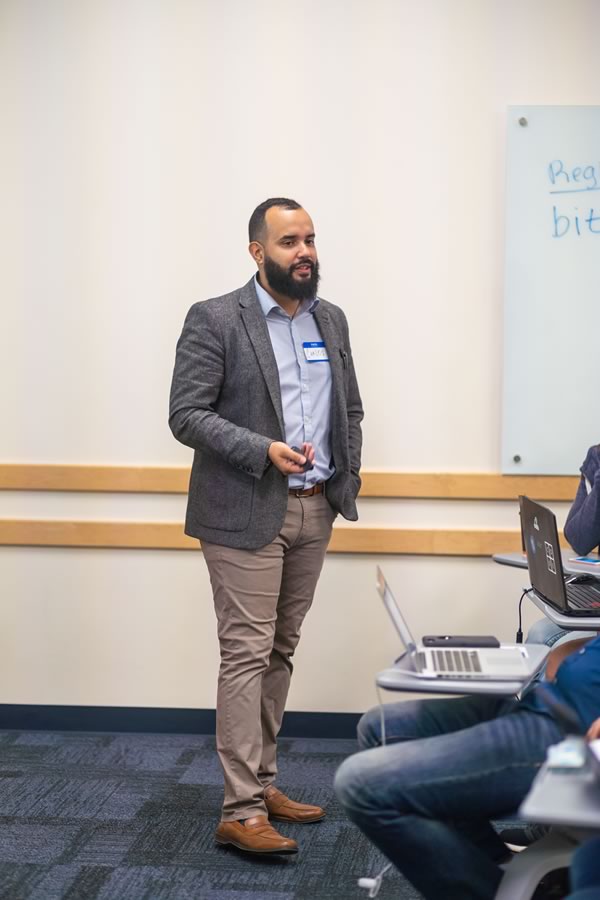
College-Level Professor Career Begins in Bay Area Along with Leadership in Year Up Program
Q: So what came next?
A: I moved to San Francisco to pursue a career in technology. I joined Year Up, a non-profit workforce development organization providing career and higher education opportunities to help young adults gain relevant skills and build a network through a six month corporate internship.
I also became an IT Professor through an innovative partnership with the City College of San Francisco, a few months after arriving in the Bay Area.
Looking at the demographics of many of the attendees from the Bay Area, you would have never bet on them to become influential tech leaders (in probably the world’s most important technology center), but they did.
I got to watch the transformational power of the program over and over and to see my mentees and students blossom.
Launching Year Up in South Florida at Miami Dade College
Q: What caused you to leave the Bay Area?
A: I was asked to lead the team responsible for helping Year Up expand into community colleges and arrived in Miami as the Founding Program Director for Year Up Miami, housed at Miami Dade College, the public college with the largest undergraduate enrollment of any college or university in the country.
I continued to teach as well, becoming an Adjunct Professor at Miami Dade College and offering a variety of technology courses.
After a successful pilot in Miami, Year Up leveraged what was learned at MDC and shifted its entire model to focus on Community Colleges, and I was really proud to have been a part of that strategic shift.
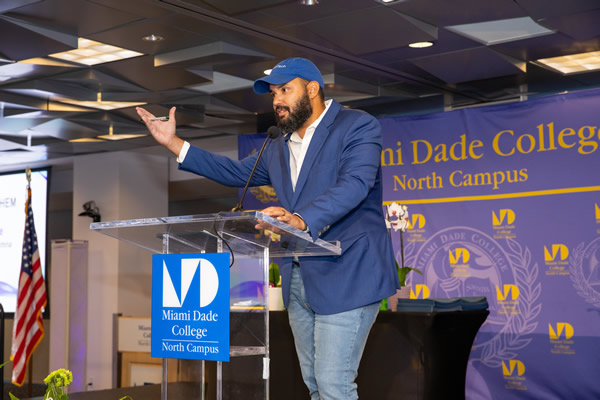
I continue to follow the program and the latest research confirms that Year Up’s earnings impact continues to be the largest reported to date for workforce programs in the nation.
Focus on Registered Apprenticeships Begins
Q: While at Year Up, you’ve mentioned that you really became interested in apprenticeships specifically as the critical piece for helping marginalized youth get both the education and on-the-job skills to land a well-compensated job. How did you first come across registered apprenticeships as a vehicle for change?
A: I think the line between philanthropy and social good got a bit blurred while at Year Up. I met employers who provided internships but didn’t really tap into the potential of the interns. They saw it more as a ‘gift’ than an investment. Apprenticeships flip that model.
Q: What’s so special about apprenticeships for communities?
A: Registered apprenticeship programs play a vital role in building stronger, more prosperous communities by fostering economic development, creating job opportunities, enhancing skills development, and promoting social inclusion and well-being.
They also contribute to economic development by providing a skilled workforce that meets the needs of local industries.
By training individuals in high-demand occupations, apprenticeship programs help businesses thrive and attract new investment to the community.
Q: You first plugged into apprenticeship creation and administration with Enstitute. How would you describe Enstitute and what was your role?
A: I became the Founding Program Director of Enstitute, which became a nationally-recognized apprenticeship program for 21st century careers. Enstitute provided students with one-year, paid, full-time apprenticeships at high-growth startups, small businesses and corporations.
The program aimed to prepare young people for the workforce and provided them with a strong foundation to pursue the career of their choice.
That combination of getting a formal education, building workforce readiness, and getting paid a living wage versus having to take on student debt or do “work study” or other jobs that don’t really lead to career development was really powerful.
Entrepreneurial Bug Hits Again and Miami EdTech Is Born
Q: After your involvement with Enstitute, the entrepreneurial bug caught you again. Tell us about Miami EdTech. When did you found it and what was the mission?
A: I founded Miami EdTech in 2017 as a non-profit organization focused on closing the skills gap in the Miami area and thus improving local economic opportunities, specifically with computer science advocacy, digital skills, and workforce development.
I’ve been really proud of how we accomplished launching our AI and UI/UX Registered Apprenticeship Programs, both of which were the first in the state of Florida.
With a focus on workforce development, we also launched our monthly Apprenticeship Accelerator Sessions which focus on informing both prospects and employers about the benefits of registered apprenticeships.
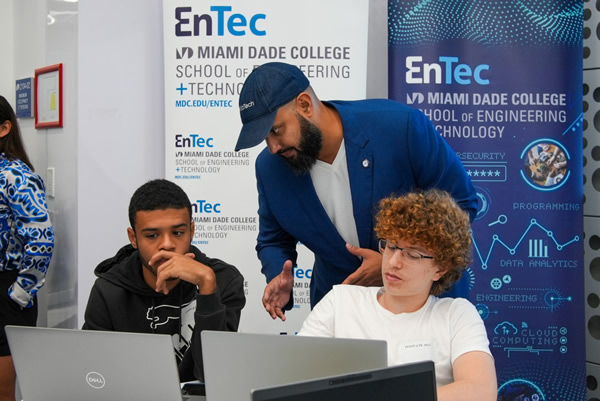
We also launched the Workforce.Miami platform in partnership with Mayor Cava’s Future Ready Initiative.
In our K-12 STEAM Programs and Professional Learning, we’ve offered over 100 hours of continuing education for teachers. Our course material includes tech-related certifications that enable Florida teachers to provide Computer Science instruction in the classroom.
We’ve also received grants from organizations such as Microsoft, Comcast, The Miami Foundation, the UD Foundation, the Department of Defense and the Hispanic Foundation.
In partnership with the M-DCPS, we’ve become their industry partner in their newly launched AI pre-apprenticeship program.
GoSprout Launches to Streamline the Launch & Management of Registered Apprenticeships (and a Whole Lot More)
Q: Your latest venture, GoSprout, is starting to take off. Tell us about it. What was the inspiration for GoSprout? What does it offer?
A: Miami EdTech has been very fulfilling professionally but can only influence a small part of the country.
I wanted to see registered apprenticeships proliferate across the country. So instead of offering the apprenticeships directly, GoSprout is an apprenticeship platform that helps employers, sponsors, and schools collaborate in the cloud and stay compliant.
I don’t know anyone that doesn’t think apprenticeships programs are phenomenal in a theoretical sense, but the complexity of stakeholder coordination and compliance when using just spreadsheets and emails has historically caused many companies to close their apprenticeship programs. For many companies that don’t have apprenticeship tracking software it’s just too expensive, even when government incentives are collected.
GoSprout streamlines the whole process, so everybody can focus on creating amazing programs that graduate apprentices with exactly the right skills and ability to thrive in a job that their communities need. The benefits of apprenticeships are amazing once you get the administrative side under control.
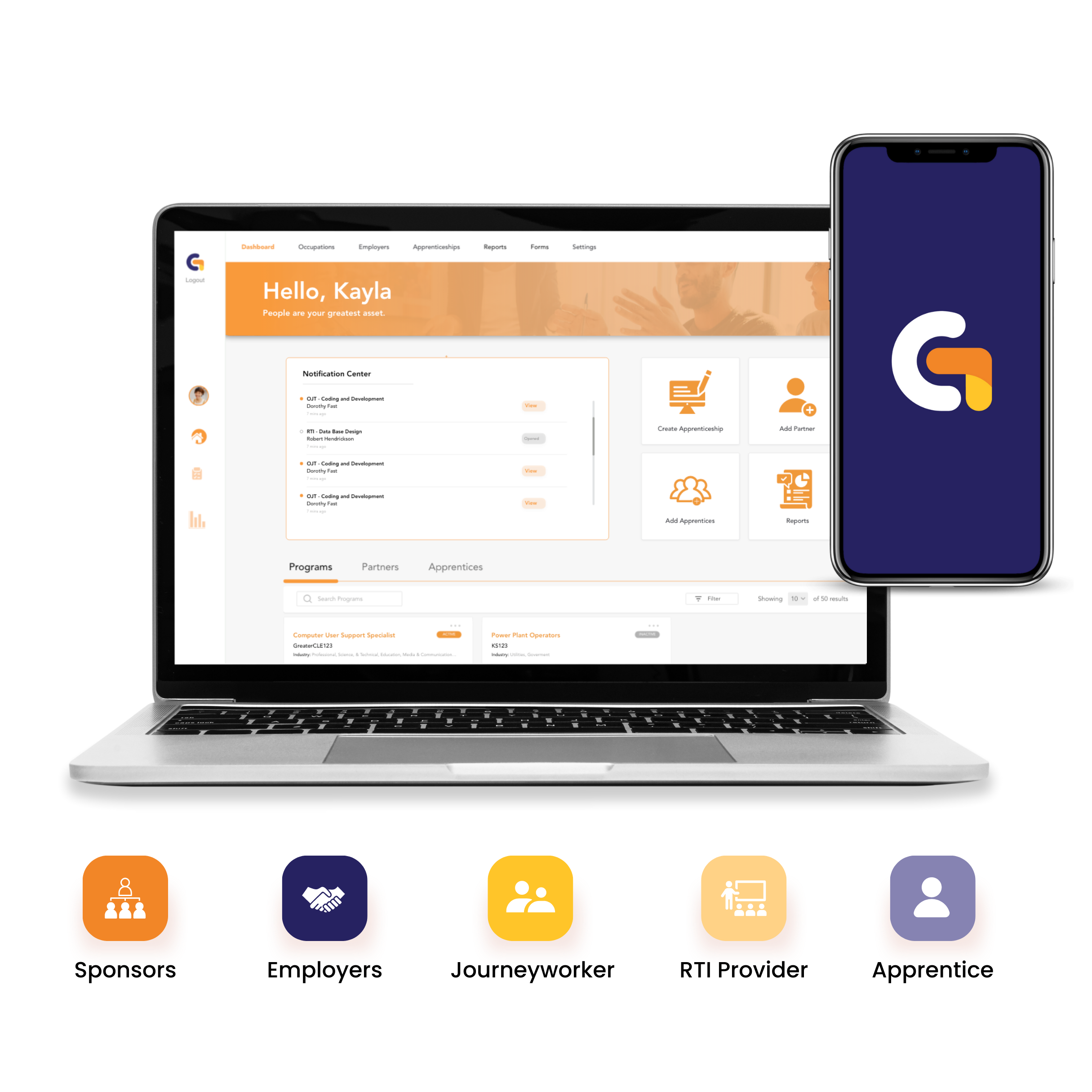
Q: You mentioned the benefits for employers above, but can you speak to the economic support available at state and federal level for companies that create apprenticeship programs?
A: Way more money is available than is claimed by employers, sponsors, and schools. At both federal and state level, the importance of filling the nation’s talent gap is not a partisan issue.
So grants are available to support all of the stakeholders: employers, sponsors, and related-training institutions.
We’re actually building out resources to make it easier to find all of these opportunities as there are so many entities that have available funding if you are part of a compliant registered apprenticeship program.
Q: It would appear even more benefits are around the corner. The DOL just released guidance for 2024. What do you see around the corner for registered apprenticeships and employers who may already have a program or are thinking about launching their first programs?
A: At the federal level, there seems to be some recognition that the ecosystem needs more guidance and organization. As with incentive programs, states tend to follow what the related federal program does.
So we’re really excited about the Department of Labor, who has all kinds of other issues to manage, really putting a strong emphasis on growing the count of registered apprenticeships across the country and helping all the stakeholders get the funding to which they are entitled.
We also see more emphasis on pre-apprenticeships, which are programs for high school students. We’ll be releasing a number of tools related to younger students this year.
Q: While GoSprout certainly has a cloud SaaS platform that handles workflow related tasks, you talk about GoSprout as being much more than that. What do you mean?
We’re really proud of the SaaS platform that we built (and are still enhancing) and the connected smart phone apps for apprentices.
But GoSprout wasn’t founded to be a software company specifically. The software provides the vehicle to have a registered apprenticeship without dealing with an administrative nightmare.
Our reason for existing is much broader than that. We’re pulling together resources for all of the stakeholders within the apprenticeship ecosystem to make it easier to evaluate, launch, administer, report on the success, etc. of this education model.
We’re not doing it alone either. We have fantastic advisors including Dr. Amy Firestone, distance-learning guru Joseph Riquelme, and have received fantastic support from heads of programs such as Puerto Rico’s Professor Luis Olivares-Lugo.
We want to see registered apprenticeship launches and adoption skyrocket over the next decade and all the good that will do for our youth, especially those from economic backgrounds like mine.
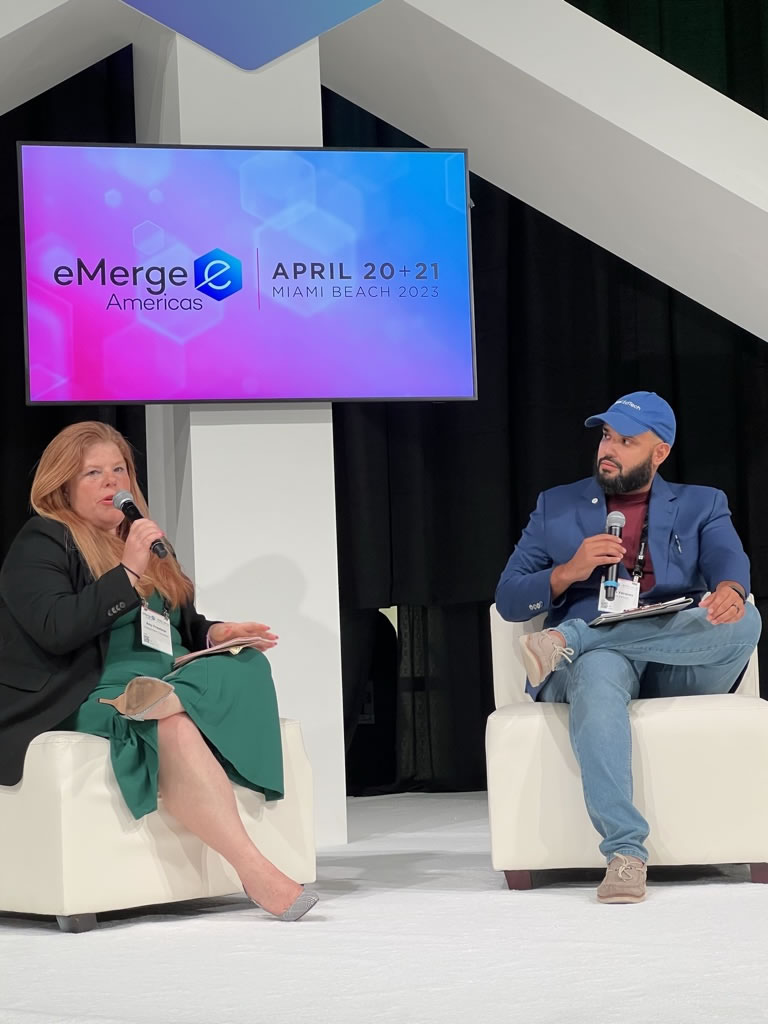
Q: Any early wins you’d care to highlight?
Obviously, my Puerto Rican roots are important to me and Miami is a diverse community heavily influenced by Latine culture, so being able to help people from similar backgrounds has been special.
GoSprout has actually been adopted in Puerto Rico by Universidad Politecnica Puerto Rico.
My team and I were invited to speak on the island about how best to increase the wage base there via apprenticeships more quickly as well last year.
But more broadly, I would just say that being able to build a business that helps youth that more than likely don’t have parental economic support get a great education AND marketable workforce skills WITHOUT crippling student debt is huge.
Every time a new stakeholder joins GoSprout, I do a little calculation of how many apprentices might eventually graduate and get a well-paid job that will give personal stability and the ability to help their family and community. It’s really exciting!
Q: Anything else you’d like to share with our community?
A: Stay tuned!
Whether you end up using our software or not, we’d love to help you accomplish your goals related to registered apprenticeships.
If you’re a potential partner, please reach out. We share resources all the time and would love to help you get the word out about what you’re doing.
Want to Learn More About Your Registered Apprenticeship Opportunities?
BOOK A FREE CONSULTATION

